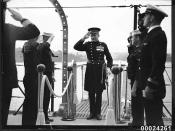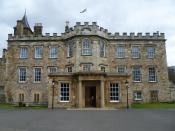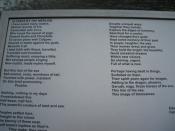The Horses "The Horses" by Edwin Muir is still very relevant to the 21st century audience even though it was written over 50 years ago. The poet explores a number of exciting images that I will have chosen to investigate in this essay.
"The Horses" concerns the aftermath of a devastating nuclear war. Edwin Muir describes the sheer horrors and immense tragedy. He illustrates the uninhabited world through the eyes of one of the very few survivors of the recent war. Towards the end of the poem we recognise that the survivors have to work with nature to live which meant they worked on farms and with animals to grow food for their use.
There are many different themes in this poem but I feel the most significant theme was nuclear war. Edwin Muir stresses the effects of nuclear war, which is still a massive issue in today's world.
"The seven day war that put the world to sleep" The poet analysis that the nuclear bombs wipeout nearly the entire human race. This line intensified the enormity of the nuclear attacks. It only took mankind seven days to destroy the world.
" Swallowed its children quick" This quote is one that brings horror to your heart. The nuclear war killed of a mammoth majority of the human race. By using swallowed, Edwin paints an image of a giant monster taking one great bite out of the world. It seems as though no one was expecting these great loses after the war.
I found another theme in this poem is survival. This poem expresses the great need to work side by side with nature; you can't turn your back on it.
"They have pulled our ploughs and borne our loads" The quote shows me that the humans are having to use old methods to live. They have changed their whole method of living and are now resorting to an ancient way of life.
Also I found it weird that after the selfish human beings pushed nature further and further out of their life's, the horses came back and forgave the humans and helped them it their time of need. It was a strange relationship between mankind and nature after the mass destruction.
"Now they where strange to us" From the view of a survivor the horses coming to lead a helping had to mankind was strange. It had been so long since humans relied on the horses to survive. It shows how much mankind had developed technology wise and highlights how wrong they where do completely ignore the important of working with nature.
Edwin Muir was a very clever poet who used many great techniques to stress his amazing ideas.
"Like a wild wave" This is an admirable simile which I really did like. The poet is describing the way in which the horses are approaching the humans. A wild wave is very dangerous, just like a heavy horse sprinting towards you. This simile could also mean that the horses maybe seeking revenge on the humans for exploiting and disrespecting them in the past.
"They look like dank sea-monsters couched and waiting" I think this simile gives you a good picture of how the tractors looked. The simile highlights destruction caused to earth by machinery. The tractors are now completely useless like dinosaurs from another age.
"Deepening drumming" This is a superb alliteration to inform the reader in the noise the horses were making when running towards mankind. It gives me the illustration of a steady drum beat getting louder as the horses get closer to the humans.
Edwin Muir's word choice in the poem was very impressive. The poem was in free verse form with speech rhythm which I sense was appropriate to the narrative poem, especially to the oral transmission: it lends reality, immediacy, naturalness and creditability. I imagine the long verse paragraphs and prose syntax was used to remarkable success in creating an atmosphere of devastation after the nuclear attack and tension of the horses' approach. Also I think that Edwin used oxymoron very well.
The poem reflects fear of our society in the 1950s that nuclear war would destroy the civilised world. The poem was written in the era of the cold war, when western missiles were poised to meet a nuclear attack from the east, with mutual destruction the only outcome.
It is a poem about the end of civilisation as we know it, yet it is not a depressing poem as there is a sense of hope towards the end. Muir has faith in the human beings to regain the innocence of childhood "Eden". He believes human beings are fundamentally good. The solution is to get back to nature where small communities work together. In cities, people are strangers, and this loss of fellowship with neighbours has led us astray.
Also Muir believes in a loving, forgiving world as the horses forgave the humans. In the poem man learns his lesson and gets back on the right path but is Muir saying the end of civilisation as we know it wouldn't be a bad thing? He tries to show we shouldn't ignore nature.
Overall I think this shows that Edwin Muir was a master in his work. This poem proved that he can change peoples' view on war and gives us good reason not to leave out nature in a technogoly driven society. Even though it was written so long ago, it still fits into our society today.
![Alexander Muir Public School, Toronto, 1902 [OHQ-PICTURES-S-R-599]](https://s.writework.com/uploads/9/95250/alexander-muir-public-school-toronto-1902-ohq-pictures-s-r-5-thumb.jpg)
![[Portrait of Ralph Burns, Edwin A. Finckel, George Handy, Neal Hefti, Johnny Richards, and Eddie Sauter, Museum of Modern Art, New York, N.Y., ca. Mar. 1947] (LOC)](https://s.writework.com/uploads/3/39226/portrait-ralph-burns-edwin-finckel-george-handy-neal-hefti-thumb.jpg)



